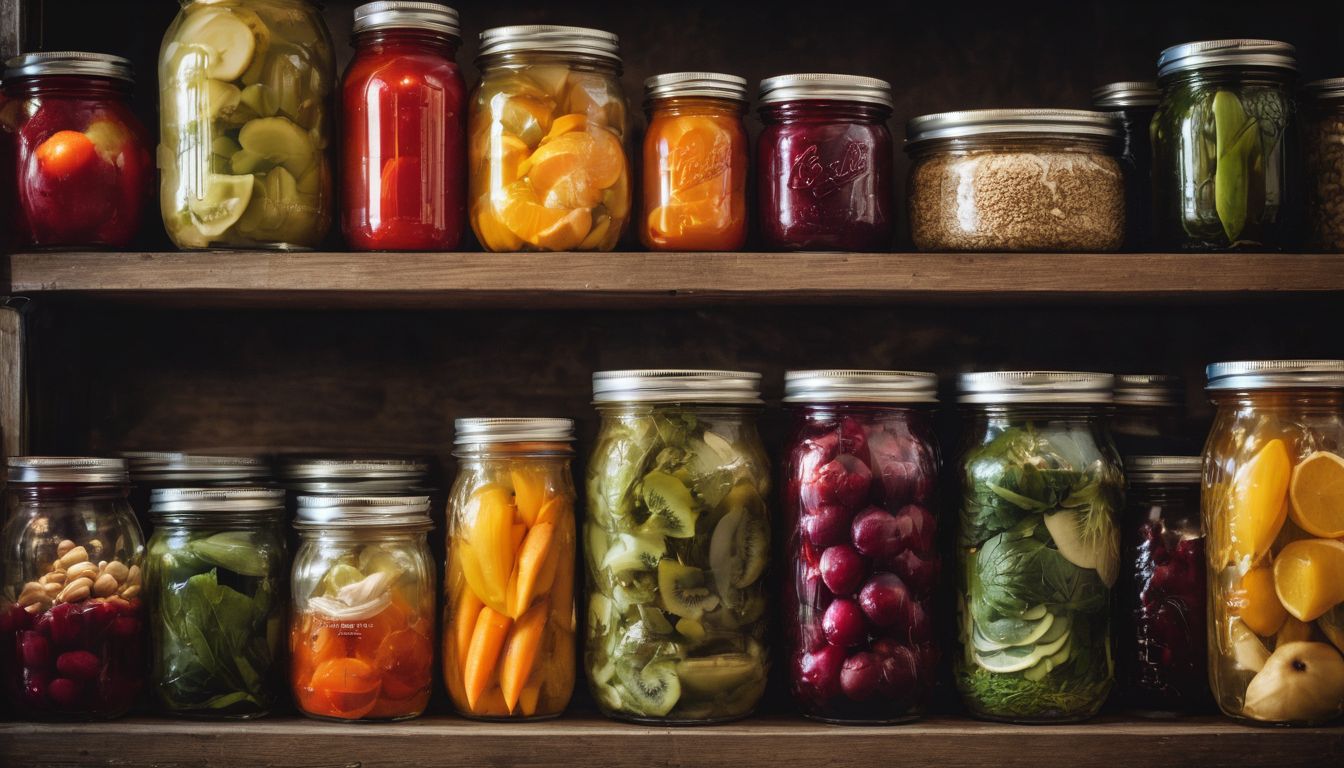Struggling to find a sustainable and healthy protein source? Look no further than sustainable seafood. Did you know that consuming sustainably sourced seafood can provide essential nutrients like omega-3 fatty acids and vitamins? In this article, we will explore the health benefits of choosing sustainable seafood options and how it can positively impact our planet. Ready to dive into the world of eco-friendly and nutritious seafood choices? Let’s get started!
Key Takeaways
- Sustainable seafood provides high-quality protein and essential nutrients, including omega-3 fatty acids and vitamins, which help lower the risk of chronic diseases such as heart disease.
- Choosing sustainable seafood supports healthy marine ecosystems, reducing bycatch and preserving natural habitats, which is essential for maintaining biodiversity in our oceans.
- Opting for certified sustainable options can reduce contamination risks from pollutants in non-sustainable fishing practices, ensuring safer consumption for humans.
- Consuming sustainable seafood helps protect cultural traditions tied to fishing in coastal communities worldwide and sustains local economies.
- Prioritising sustainable choices contributes to fighting climate change by lowering the carbon footprint associated with traditional fishing methods.
Definition of sustainable seafood
Sustainable seafood comes from sources, either fished or farmed, that can maintain or increase production in the future without jeopardising the ecosystems from which it was acquired.
This method supports marine biodiversity by allowing species and habitats to thrive while providing nutritious protein for a growing population. It takes into account the long-term viability of each species and ensures communities benefit from fishing industries that practice responsible sourcing.
Choosing sustainable seafood involves conscientious eating habits that honor ocean conservation efforts. Ethical seafood choices help protect our oceans’ health, ensuring a balanced ecosystem through sustainable fishing practices.
Ecofriendly seafood not only preserves natural resources but also provides essential nutrients such as omega fatty acids, vital for human health. Consumers have the power to drive change within the thriving seafood industry by supporting environmentally responsible practices and demanding ethically harvested products.
The Importance of Prioritising Sustainable Seafood
Prioritising sustainable seafood is crucial for supporting healthy marine ecosystems, boosting local economies, and reducing contamination risks. By choosing sustainably sourced seafood, you can help protect the environment and ensure a steady supply of fish for future generations.
Supporting healthy ecosystems
Choosing sustainable seafood helps maintain the delicate balance of marine life. By opting for species that are plentiful and managed well, we protect diverse ocean habitats and ensure they thrive.
Sustainable fishing methods avoid destroying coral reefs and sea floors, which are vital nurseries for young fish.
Responsible seafood sourcing also means fewer bycatch animals, such as dolphins, turtles, and seabirds getting caught unintentionally. This careful approach to fishing sustains populations of both target and non-target creatures.
It allows ecosystems to function properly, supporting a rich variety of life under the sea which in turn supports our planet’s overall health.
Healthy oceans filter greenhouse gases and provide us with oxygen – making every choice for sustainable seafood an investment in our global ecosystem‘s future. It ensures that future generations can enjoy bountiful seas teeming with life just as we do today.
Responsible consumption sends a message that we value the environmental impacts of our food choices on this finely-tuned aquatic world.
Boosting local economies
Sustainable seafood choices support local economies by creating jobs within fishing communities. When consumers opt for responsibly sourced seafood, they contribute to the livelihood of fishermen and their families, helping to sustain coastal economies.
This commitment encourages the growth of sustainable fishing practices and promotes economic stability in these regions.
By prioritising sustainable seafood, individuals can actively participate in supporting local economies and ensuring the continued viability of coastal communities. Fisheries that adopt responsible practices not only benefit from increased demand but also contribute to a healthier marine environment for future generations to enjoy.” The Undeniable Health Benefits”.
Reducing contamination risks
Choosing sustainable seafood can significantly reduce the risks of contamination from pollutants and harmful chemicals. By supporting responsible fishing practices and opting for well-managed fisheries, you can lower the chances of consuming seafood contaminated with mercury, PCBs, and other toxins that pose health hazards to humans.
Additionally, sustainable seafood sources are often subjected to stringent quality control measures, reducing the likelihood of bacterial contamination that can lead to foodborne illnesses.
Health Benefits of Sustainable Seafood
Sustainable seafood is a high-quality protein source that provides essential nutrients like omega-3 fatty acids and vitamins, lowering the risk of chronic diseases. To learn more about the health benefits of sustainable seafood, keep reading!
High-quality protein source
Sustainable seafood serves as a high-quality protein source, providing essential amino acids necessary for the body’s growth and repair. It offers an excellent alternative to land-based sources of protein, promoting muscle development and overall health.
Including sustainable seafood in your diet ensures that you are consuming a nutrient-dense food that supports both personal well-being and environmental sustainability.
Moreover, sustainable fishing practices safeguard the delicate balance of marine ecosystems while providing a reliable supply of healthy protein. By prioritising sustainable seafood consumption, individuals can contribute to the preservation of ocean biodiversity while nourishing their bodies with top-quality nutrients like omega-3 fatty acids and vitamins.
Essential nutrients like omega-3 fatty acids and vitamins
Sustainable seafood is an excellent source of essential nutrients that are beneficial to your health, including omega-3 fatty acids and a variety of vitamins.
Lower risk of chronic diseases
Sustainable seafood consumption can significantly lower the risk of chronic diseases. Eating fish as part of a balanced diet can reduce the chances of heart disease, stroke, and even depression due to its high levels of omega-3 fatty acids.
A diet rich in sustainable seafood also provides essential nutrients like vitamins D and B2, calcium and phosphorus.
Choosing responsibly sourced seafood supports your health by reducing exposure to contaminants such as mercury, PCBs, dioxins and other industrial chemicals that are typically found in non-sustainable fishing practices.
Sustainable Seafood’s Impact on Climate Change
Sustainable seafood choices can help reduce the carbon footprint associated with fishing and preserve natural resources, ultimately contributing to mitigating the impacts of climate change.
Reducing carbon footprint
By choosing sustainable seafood, you actively reduce your carbon footprint. Sustainable fishing practices aim to minimise energy consumption and greenhouse gas emissions throughout the entire supply chain – from catching to processing and transportation.
Opting for responsibly sourced seafood supports efforts to combat climate change by promoting more efficient resource utilisation and reducing the environmental impact of fishing activities.
Consuming sustainably harvested fish contributes to preserving marine ecosystems, helping mitigate ocean acidification and loss of biodiversity caused by unsustainable fishing methods.
Preserving natural resources
Transitioning from reducing carbon footprint to preserving natural resources, sustainable seafood choices help preserve natural resources by promoting responsible fishing practices and ensuring the long-term availability of marine life.
By choosing sustainably sourced seafood, you contribute to maintaining healthy fish populations and safeguarding ocean ecosystems for future generations. This proactive approach fosters biodiversity in our seas and helps protect vital natural resources essential for a balanced and thriving marine environment.
Cultural and Traditional Significance of Sustainable Seafood
Sustainable seafood plays a key role in maintaining cultural traditions and supporting sustainable fishing practices. It ensures that future generations can continue to enjoy the unique cultural significance of seafood in their local communities.
Maintaining cultural traditions
Supporting sustainable seafood choices aligns with the cultural traditions of many coastal communities, where fishing has been a way of life for generations. These traditions are deeply rooted in the practice of responsible fishing and honouring the marine environment, ensuring that future generations can continue to enjoy the bounties of the sea.
By prioritising sustainable seafood consumption, individuals can play an active role in preserving these cultural customs and supporting local fishing practices.
Incorporating sustainable seafood into one’s diet not only contributes to environmental conservation but also helps preserve age-old traditions that celebrate respectful and mindful interactions with nature.
Learning about different cultural relationships with seafood can provide insight into how these practices have sustained ecosystems and supported livelihoods for centuries. Embracing these traditions through responsible consumption empowers individuals to be stewards of their natural surroundings while enjoying nutritious and delicious meals.
Supporting sustainable fishing practices
Sustainable fishing practices involve methods that respect the marine environment and support the longevity of fish populations. By choosing seafood from responsibly managed sources, you contribute to maintaining healthy ocean ecosystems and safeguarding aquatic biodiversity.
Supporting sustainable fishing practices also means endorsing fair labour standards for fishermen and ensuring the long-term viability of local economies reliant on fishing.
Engaging in responsible seafood consumption empowers you to play a crucial role in preserving traditional fishing cultures and techniques. It also aids in minimising the pressure on vulnerable species, allowing them time to replenish their populations sustainably.
Tips for Incorporating Sustainable Seafood into Your Diet
When adding sustainable seafood to your diet, choose abundant and quickly reproducing species to help maintain healthy fish populations. Look for affordable and certified options, and don’t be afraid to try new recipes with sustainable seafood as a delicious and nutritious alternative.
Choosing abundant and quickly reproducing species
When choosing sustainable seafood, opt for abundant and quickly reproducing species to support healthy marine populations. Look for options like mackerel, sardines, and anchovies that are known for their rapid reproductive rates.
These species are resilient to fishing pressure and have a lower risk of being overexploited, helping to maintain the balance of ocean ecosystems. By selecting these varieties, you can contribute to the conservation of marine biodiversity while enjoying nutritious and eco-friendly seafood choices.
Supporting sustainable fishing practices by prioritising abundant and quickly reproducing species is essential in promoting responsible seafood sourcing. By consciously selecting these types of fish, you can make a positive impact on both your health and the environment.
Finding affordable and certified options
To support sustainable seafood consumption, seek out affordable and certified options. Look for eco-certifications like MSC or ASC when purchasing seafood to ensure it meets sustainability standards.
Additionally, consider joining community-supported fisheries or purchasing directly from local fishermen to access affordable and sustainable seafood choices. By prioritising certified options, you contribute to the preservation of ocean ecosystems while also supporting local fishing communities.
When selecting sustainable seafood, compare prices and availability across different retailers. Seek out budget-friendly species that are abundant and quickly reproducing to make environmentally conscious choices that align with your values.
Trying new recipes and using the CookinGenie app for recommendations.
To incorporate sustainable seafood into your diet, expand your culinary horizons by trying new recipes and seeking recommendations from the CookinGenie app. Experiment with diverse cooking methods like grilling, poaching, or baking to bring out the natural flavours of different sustainable seafood options.
Whether it’s a zesty tuna salad or a delightful salmon curry, diversifying your recipe repertoire not only adds excitement to meal times but also supports sustainable fishing practices.
You can use the CookinGenie app for inspiration on how to prepare sustainably sourced seafood in delicious and environmentally friendly ways. This way, you can confidently cook up delectable meals while making mindful choices that support environmental conservation and promote sustainable fisheries.
Conclusion
Incorporate sustainable seafood into your diet for a healthier lifestyle. Enjoy high-quality protein and essential nutrients, such as omega-3 fatty acids. Reduce the risk of chronic diseases with sustainable seafood choices.
Make an impact on both your health and the health of our planet through conscious consumption.
FAQs
1. What are the health benefits of eating sustainable seafood?
Eating sustainable seafood provides nutritional benefits, like important vitamins and omega-3 fatty acids that boost your overall health.
2. Why is it important to choose sustainable seafood?
Choosing sustainable seafood helps maintain ecosystem balance, supports hunger relief by ensuring future fish stocks, and reduces negative environmental impacts.
3. Can sustainable fishing really improve my health?
Yes, the health benefits of sustainable fishing include consuming fewer contaminants and a higher quality of nutrients essential for your body’s well-being.
4. How does the sustainable seafood industry affect our planet?
The sustainable seafood industry strives to protect ocean life and habitats, which leads to healthier food options and a better environment for us all.





